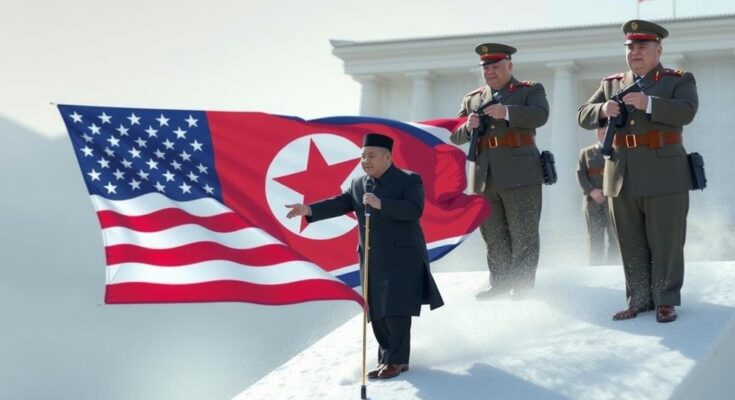North Korea’s Kim Jong Un has articulated a strong response strategy towards the U.S. during a recent ruling party meeting. North Korea perceives U.S. alliances with South Korea and Japan as a threat, prompting a call for heightened national security. The meeting also discussed disaster recovery efforts and strengthening relations with friendly countries amidst growing military cooperation between the U.S., South Korea, and Japan.
During a critical ruling party assembly, North Korean leader Kim Jong Un articulated a robust strategy aimed at responding to the United States, as reported by state media outlet KCNA. This declaration aligns with North Korea’s focus on enhancing national security measures in light of perceived threats. The report described the U.S. alliance with South Korea and Japan as evolving into a “nuclear military bloc,” thus characterizing South Korea as an “anti-communism outpost” for American interests.
The assembly, which convened between December 23 and December 27, also addressed various issues, including the efforts to manage the fallout from flooding earlier in the year. Authorities discussed relocating affected individuals to the capital, Pyongyang, highlighting the government’s commitment to disaster recovery. Additionally, North Korea expressed intentions to strengthen ties with nations considered friendly.
This meeting was part of the 11th plenary session of the eighth central committee of the Workers’ Party of Korea, marking a year that included notable diplomatic exchanges, such as a summit between Kim and Russian President Vladimir Putin, which resulted in a mutual defense pact. This development has drawn criticism from Washington and Seoul regarding alleged military aid, including potential deployments of North Korean troops to support Russia in its ongoing conflict in Ukraine.
The current geopolitical dynamics in East Asia have been heavily influenced by North Korea’s positioning against U.S. partnerships with South Korea and Japan. Kim Jong Un’s declaration comes amidst heightened tensions and a perceived consolidation of military alliances that threaten North Korean sovereignty. In recent years, North Korea has witnessed increasing collaboration between its adversaries, prompting actions that underscore its strategic response to safeguard its national interests. The reaffirmation of ties with friendly states is emblematic of North Korea’s pursuit of a supportive international environment.
In summary, Kim Jong Un’s announcement of a “strongest” response strategy underscores North Korea’s determination to fortify its defenses in the face of evolving U.S. alliances in the region. The assertion of South Korea’s role as an American ally, coupled with ongoing military cooperation with Russia, presents significant challenges for North Korea, which is seeking to navigate its security landscape while strengthening ties with sympathetic nations. The outcomes of this strategic meeting may influence future diplomatic relations and military posturing in Northeast Asia.
Original Source: www.hindustantimes.com




